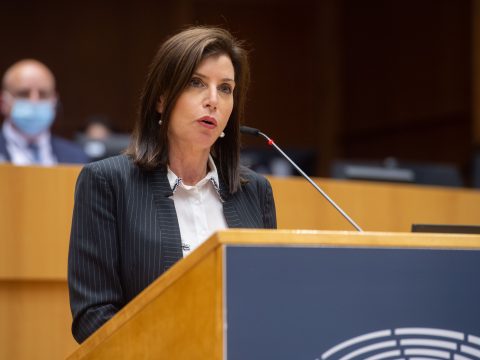27/09/2021
Op-ed in euractiv: “A chance for a transatlantic reset”
The EU-US Summit last June marked the “reset” of the transatlantic relationship, and the announcement of a Trade and Technology Council was one of its major, tangible outcomes. Since President Biden’s election, progress in reconstructing a proactive EU-US relationship has been slow.
Long-standing issues over steel and aluminium tariffs remain unresolved, there is still a lack of detail on what the US hopes to achieve from WTO reform, and the US withdrawal from Afghanistan created additional tensions in many Member States. AUKUS is, therefore, yet another item on the list for those that see a wider pattern where the US will systematically overlook the European Union as the Trump policy of “America First” continues, albeit with a smile.
In the shadow of AUKUS, we now see some of this thinking reflected in public at the highest levels of the EU, with Commission President Von der Leyen talking about “clarifying” how the US conducted itself over AUKUS before carrying on with “business as usual”, and Council President Michel going further, questioning America’s “transparency and loyalty” as an ally.
President Macron is rightly angered by this incident. France has seen a deal five years in the making tossed aside for an alternative project without any prior engagement or notice. This is a heavy blow to a prestige project at the centre of France’s Indo-Pacific Strategy. It has further spurred President Macron to renew his push for “strategic autonomy” at the EU level, a topic which will figure prominently during France’s presidency of the EU and in President Macron’s election campaign narrative.
Last week’s call between Biden and Macron allows us to move forward, but it would be naive to think that AUKUS is going to be quickly forgotten. As Chancellor Merkel’s departure looms and President Macron seeks to secure a second term in April of next year, the Franco-German power axis of Europe is in flux. While the new German Government is in formation, President Macron will of course see this as a time to assert his vision.
For strong supporters of the transatlantic relationship like myself, the question is where do we go from here? We have to accept that there will always be areas where the EU and US have conflicts of interest, but we should not let these blind us to our fundamental shared values, and joint vision for world governance. When it comes to security and models of governance, the US will always be our closest partner and ally.
We need to draw a line in the sand over AUKUS. Ambassadors were recalled, strong verbal rebukes have been made at the most senior level, and the EU’s FTA with Australia hangs in the balance. In line with the principles of solidarity, we have made it clear to the US and Australia that AUKUS will have consequences, and that a problem for one Member State is a problem for all Member States. The message is clear. So now we should focus on moving forward.
The Trade and Technology Council (TTC) inaugural meeting is a good starting point for de-escalation. The TTC can be a forum for genuine debate and a means to find convergence on some of our biggest joint challenges such as a human-centred AI regulatory framework, securing supply chains of semi-conductors, and counteracting trade malpractices of non-market economies.
The lack of any explicit reference to China in the TTC draft conclusions that have appeared in the press highlights the elephant in the room when it comes to the underlying fault line in EU-US relations. The US is much clearer in its objectives to counter China as a systemic rival than the EU’s more nuanced approach. In this sense, relations have still not recovered entirely from the EU’s initial decision to push ahead with the China Investment Agreement (CAI), despite emphatic pleas from what was then the incoming Biden administration to hold–off.
Regardless of “who started it”, the EU desperately needs to find some consistency in its’ joint responses to third countries. As an example, Turkey has blatantly and repeatedly violated international law and Greece’s airspace and conducted illegal drilling in Cypriot waters. These provocations are direct attacks on two EU Member States, all set against a backdrop of Turkey’s continued weaponizing approach to its migration policy and its aggressive geo-political stance in the Middle East.
In the case of Turkey, the Council has promoted a “positive agenda” aimed at fostering dialogue and modernising the Customs Union. If we can employ such a strategy in the case of Turkey’s behaviour, one would expect at least the same when it comes to the United States!
As the EU seeks to build its credibility as a geopolitical actor it obviously can’t remain silent on AUKUS. But let’s not allow this incident to dominate our relations with our largest and most important partner. The TTC meeting is a chance to build bridges, so let’s not waste it!













